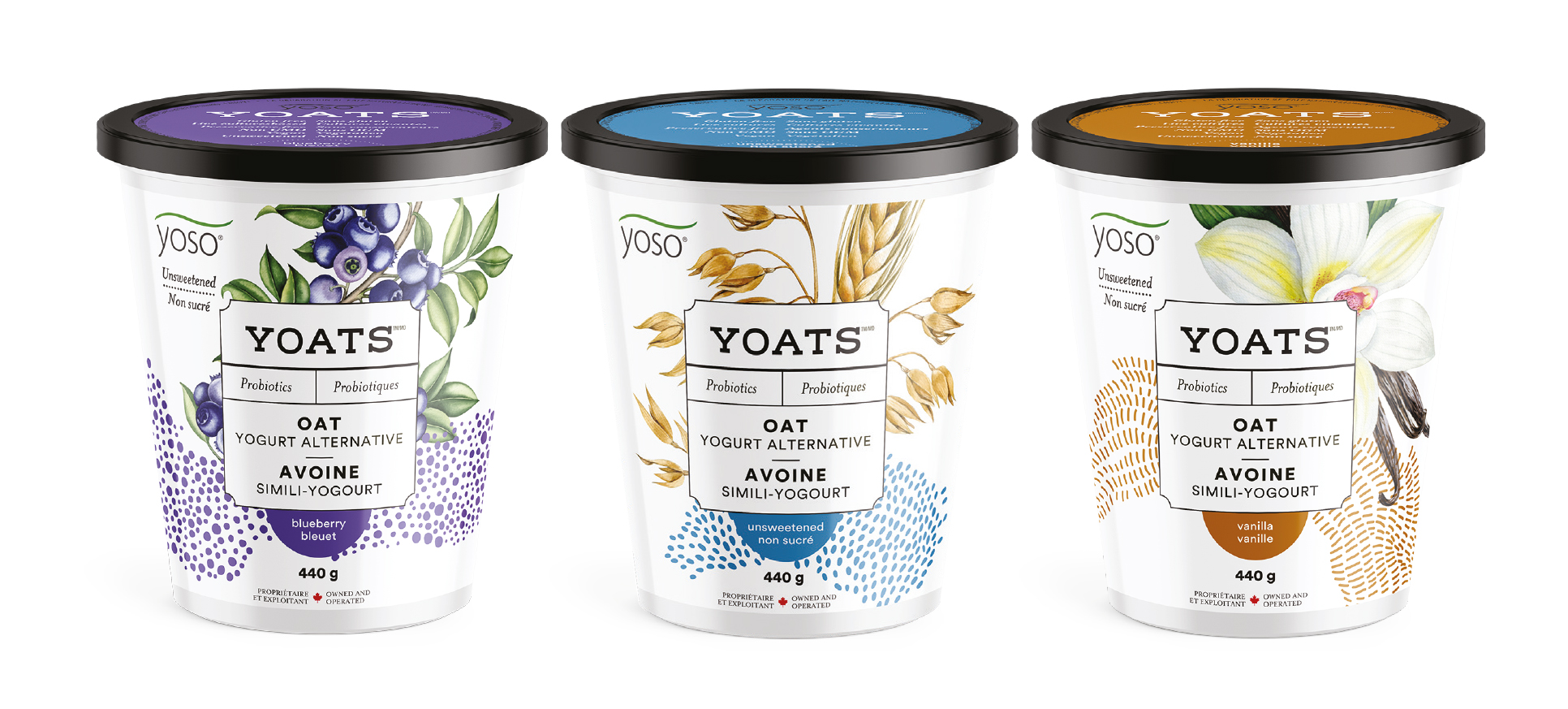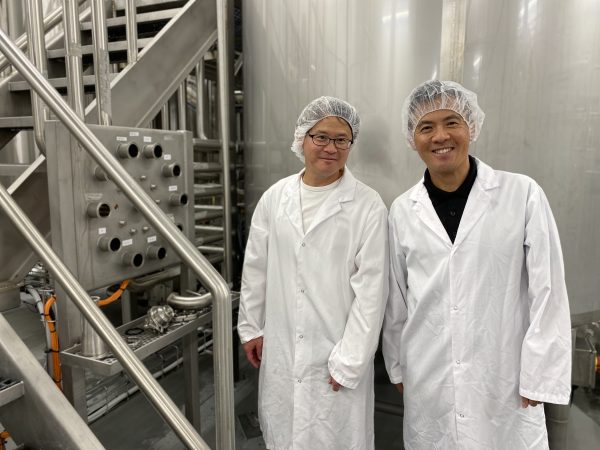
Plant-based foods are the future
By Francis Lo and Erik Lo
Food Trends Plant-based foods dairy alternatives Yoats Yoso
The last two years have reminded us about the importance of a strong immune system. A strong immune system gives us resilience when we confront uncertainty and challenges. Nutritionists have known for years about the link between gut health and the body’s ability to fight illness. Now that knowledge appears to be spreading among the general public, as evidenced by the surge in consumer demand for probiotics and fermented foods. At the same time, there is a huge uptick in plant-based food purchasing. Specifically, dairy alternatives have seen a dramatic increase and food manufacturers—even traditional dairy brands—are regularly bringing new products to market. These trends are converging in 2021 with new introductions to the Canadian market.
Recent data from Nielsen has shown exponential growth in the sales of plant-based foods in Canada. At the end of 2020, plant-based sales were up by 25 per cent, making the industry worth more than $600 million. Plant-based options are proving to be not only healthier for humans, but also for the environment. For example, using oats to create milk, ice cream and yogurt alternatives results in an 80 per cent reduction in greenhouse gas emissions from oat crop production, and uses 60 per cent less energy compared to what’s required to produce cow’s milk.
When it comes to our own health, plant-based dairy alternatives offer a variety of benefits; they are lower in saturated fats, dense in the vitamins and minerals found in the plants, and oat-based products are high in fibre. All of these characteristics are known to support better gut and heart health.
This change in consumer behaviour has been a slow shift. Plant-based diets traditionally were only popular among vegans and vegetarians, but are now gaining traction among a wider segment of consumers. This shift is due in part to the newly updated Canada Food Guide, which emphasizes legumes, vegetables and lean proteins, and no longer features traditional dairy products.
Barriers for large-scale adoption of dairy alternatives
Even though evidence suggests Canadians are warming to more holistic and plant-based diets, there are still some barriers preventing widespread adoption of dairy-alternative products. These barriers include perceptions about the taste and texture of plant-based foods as well as the idea that they are over-processed. Additionally, many plant-based food products are full of sugar and/or other additives, intentionally designed to make up for the missing flavour and texture of traditional dairy products.
For example, let’s look at plant-based yogurt as an example of how the sector is evolving. Dairy-alternative yogurts, regardless of the base (coconut, soy or almond/cashew) typically fall into three categories:
- plain with no flavours, sugars or artificial sweeteners added;
- flavoured with added sugars; and
- flavoured with artificial sweeteners.
What is missing? Plant-based yogurt products that are flavourful, nutritious and do not contain added sugars. These products typically have fewer ingredients that consumers can recognize. Promoting simpler ingredients can be challenging for food manufacturers, and many popular yogurt brands—both traditional and plant-based—rely on binding agents and preservatives. When these are removed, we are getting a more balanced and healthy diet.
Developing nutritious plant-based products
Those companies that are doing it right are also seeing the benefits that come from adding pre- and probiotics. These gut health-promoting elements have long been available in fermented foods—kimchi and kombucha contain bioactive compounds with prebiotic, antimicrobial, and anti-inflammatory elements. These foods have been consumed by many cultures for hundreds, if not thousands, of years. Today, antimicrobials are viewed as beneficial ingredients in everything from plant-based yogurts to common kitchen spices such as cinnamon and turmeric.
Kefir, too, is a fermented dairy-based drink that is the next frontier in plant-based innovation. It is traditionally the result of mixing “kefir grains”, a complex structure of bacteria and yeasts with proteins, lipids and naturally occurring sugars and milk. The micro-organisms ferment the naturally occurring milk sugar and lactose into a sour carbonated beverage. Kefir is especially high in protein and calcium while being low in carbohydrates. The global kefir market is worth approximately USD1.3 billion in 2018 and is expected to reach $2.3 billion by 2022.

Erik Lo and Francis Lo
Hurdles: Product development
Product development is critical. To deliver innovation, great taste and value to consumers can be challenging. Soy is probably the most challenging when it comes to product development due to its unique flavour.
For the authors, it’s all about learning by trying. For example, when it comes to the development of vegan dairy substitutes, the authors’ company Yoso selectively enhances some of the characteristic and desirable flavours originally present in the plant extract, such as nutty notes, by an appropriate level of tartness during the yogurt-making process.
Sometimes this selective flavour enhancement process requires more upfront work to physically remove the undesirable flavours in the plant extract during its preparation from farm crops. The challenge is to strike a delicate balance between the characteristics of the plant and the sensory features of dairy foods.
Ingredient sourcing
Ingredient sourcing has been challenging during the pandemic. Processors of dairy-based products had to spend more time sourcing ingredients especially imported ones such as coconut. There is a shortage in supply of many food ingredients as well as an increase in logistical costs and delays.
Equipment
There is a similar ripple effect on equipment as well, as prices of materials such as stainless steel have gone up. Equipment parts often have limited availability and long lead times.
Innovation
Innovation comes in several dimensions. It is a daily effort and commitment, as well as to induce the “light bulb” moment when it comes. For instance, 30 per cent of Yoso’s R&D team is dedicated to innovation so that the company continues to bring new ideas and elements to their plant-based yogurts as well as diversify into other plant-based food categories and open up to new channels and territories.
Automation
Automation has helped the authors’ company increase its production capacity. Their new facility in Cambridge, Ont., is capable of reaching its output capacity from the batching of weighted ingredients to the palletization of packaged products at the level of four times larger than the previous plant. Additionally, the new production line is also equipped with an advanced level of programmable automation for safer production under more precise automatic controls at better efficiency in terms of energy and yield (i.e. the recovery of processed ingredients into packaged products). These equipment features also allow Yoso to process field crops into finished products in a wholesome way. Yoso moved to this facility in October 2020 and its modular design allow the team to straightforwardly integrate the future “building blocks of new equipment” into their existing process for plant upgrade and expansion purposes.
Further, the new Cambridge plant is equipped with more functional process equipment that allows the company to prepare great tasting and visually appealing plant-based foods with less food additives such as gum thickening agents.
Sustainability
The authors’ also focus on one of their four core values of “less is more”, and not just with foods, but also in terms of new projects involving the development of energy resources required to support the plant including natural gas, water and electricity.
As consumer desires shift to more plant-based options it is essential that leaders in the industry pay attention to consumer demands. The goal is no longer just to create a meat-free alternative but to have a plant-based product that has a more holistic ingredient list. Forging ahead, we anticipate a push for more flavour-dense, additive-free, plant-based products that come from locally sourced ingredients.
Brothers Erik and Francis Lo have been providing Canadians with non-dairy food options for almost 20 years. They came to Canada in the 1980s and shortly after university started experimenting with ideas for a gourmet dairy-free spread made with locally grown soybeans from Ontario. Their grandfather Dr. K.S. Lo was the first to commercialize soy milk in the 1940 in Hong Kong. Their father, Frank Lo, was a scientist of dairy-free cheese and an inventor who held two U.S. patents dated back in 1970s. The Lo brothers are continuing a family tradition with their business and today, their plant-based product line includes oat, coconut, soy and almond/cashew.
Print this page